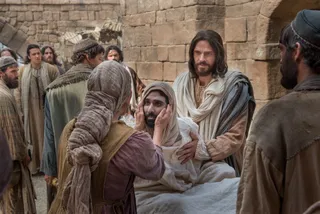Home » Bible Videos » Ministry of Jesus » The Parable of the Wheat and the Tares
Bible Video: The Parable of the Wheat and the Tares
Scripture: Matthew 13:36-43
In this Bible video, about Jesus, he is giving the meaning of the parable of the wheat and the tares (Matthew 13:36-43). However, a few verses before in Matthew 13:25-30, Jesus gives the actual parable of the wheat and the tares.
Ready to challenge yourself with some Bible trivia? Test your knowledge by taking one of our Bible Quizzes.
Previous Video about Jesus' Life
Jesus Brings the Son of the Widow of Nain Back to Life
Subscribe: For a Daily Video
Bite-Size Videos About Jesus' Life
Privacy Policy/Terms of Service: We will never sell or give away your email.
More About this Video (continued from above)
First let’s talk about the actual parable in. So, while a man slept, his enemy came and planted tares (weeds) in his field of wheat. When his workers/reapers found out that tares had been planted, they came to the owner of the field and told him that tares had been planted in the field. They asked if they should pull out the tares. The wise owner said, if you pull out the tares, you will also end up pulling out the wheat and both will be lost. However, if you wait until both are fully grown, at harvest time, we can separate the wheat from the tares and burn the tares and put the wheat into the barn. The video and the paragraph below show the interpretation of the parable. You can also test your knowledge on the New Testament stories and many other topics by taking our Bible Quizzes (link above).
In Matthew 13:36-43 is the interpretation of the Parable of the Wheat and the Tares give by Jesus. He said that the man who originally planted the good seeds is Himself (Jesus). The field represents the world and the good seed are the good people of the earth. The enemy who planted the tares is the devil, and the harvesters are the angels. The reason that the tares (wicked people of the earth) can’t be destroyed leaving only good upon the earth is because there must be opposition in all things (2 Nephi 2:11). If the good didn’t have to be strong in the face of evil, they would never grow to their full potential.


